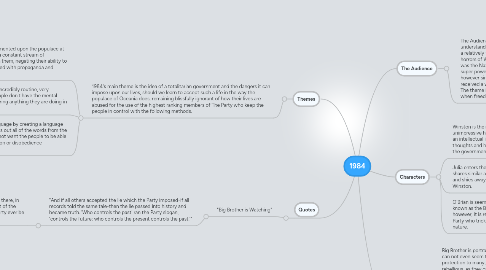
1. Themes
1.1. 1984's main theme is the idea of a totalitarian government and the dangers it can impose upon our lives, should we learn to accept such a life in the way the populace of Oceania does, remaining blissfully ignorant of how their lives are abused for the use of the highest ranking members of The Party who keep the people in control with the following methods.
1.1.1. Psychological manipulation is implemented upon the populace at large in order to barrage them with a constant stream of information, designed to overwhelm them, negating their ability to think freely, as their thoughts are filled with propaganda and hatred.
1.1.2. By keeping the populace in an incredibly routine, very arbitrary day to day life, the people don't have the mental fortitude, nor the dexterity to bring anything they are doing in to question.
1.1.3. 1984 Illustrates the importance of language by creating a language called Newspeak which essentially cuts out all of the words from the English language that The Party does not want the people to be able to use, and by doing so, making rebellion or disobedience inconceivable
2. Quotes
2.1. "Big Brother is Watching"
2.1.1. "And if all others accepted the lie which the Party imposed-if all records told the same tale-then the lie passed into history and became truth. 'Who controls the past' ran the Party slogan, 'controls the future: who controls the present controls the past.'"
2.1.1.1. "If there was hope, it must lie in the proles, because only there, in those swarming disregarded masses, eighty-five percent of the population of Oceania, could the force to destroy the Party ever be generated."
2.1.1.1.1. "It was curious to think that the sky was the same for everybody, in Eurasia or Eastasia as well as here. And the people under the sky were also very much the same--everywhere, all over the world, hundreds or thousands of millions of people just like this, people ignorant of one another's existence, held apart by walls of hatred and lies, and yet almost exactly the same--people who had never learned to think but were storing up in their hearts and bellies and muscles the power that would one day overturn the world."
3. The Audience
3.1. The Audience of 1984 is of the utmost importance when understanding the stories theme. At the time Orwell was writing to a relatively frightened audience who was still getting over the horrors of WWII. The world had witnessed the horror show which was the Nazi regime and centerstage was now the new growing super power, the USSR. Polar opposite politically than the Nazi's however similar totalitarian notions persisted. Readers at the time received a warning from Orwell of the dangers of such a regime. The theme is still Universal however, being relevant in any time when freedoms are threatened.
3.1.1. New node
3.1.2. New node
